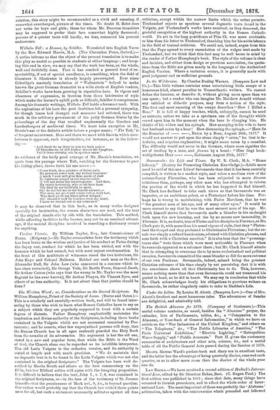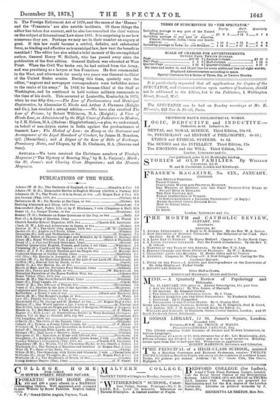LAW BOOKS.—We have received a second edition of Balleck's Interna-
tional Law, edited by Sir Sherston Baker, Bart. (C. Kegan Paul.) The first edition was published in 18G1 ; since that date, many things have occurred to furnish precedents, and to affect the whole order of Inter- national Law. The most important of these was probably the 'Alabama' arbitration, taken with the controversies which preceded and followed it. The Foreign Enlistment Act of 1870, and the cases of the Huasco ' and the 'Franconia' are also notable incidents. Of these things the editor has taken due account, and he also has consulted the chief writers on the subject of International Law since 1861. It is surprising to see how numerous they are. Perhaps we may see in their number an augury of good. If this law could become a settled, definite, and substantial force, as binding and effective as is municipal law, how vast the benefit to mankind ! The editor has also added a brief memoir of the accomplished author, General Henry W. Halleck, who has passed away since the publication of the first edition. General Halleck was educated at West Point. When the Civil War broke out, he had retired from the Army, and was practising as a lawyer at San Francisco. He first commanded in the West, and afterwards for nearly two years was General-in-Chief of the United States armies. Diming this time, quaintly says the editor, "negroes and newspaper correspondents were forbidden access to the ranks of his army." In 1864; he became Chief of the Staff at Washington, and he continued to hold various military commands to the time of his death. This occurred at Louisville, Kentucky, in 1873, when he was fifty-five.—The Law of Parliamentary and Municipal Registration, by Alexander C. Nicols and Arthur J. Flaxman (Knight and Co.), has reached a second edition.—We have also received The Law of Prisons, by Robert 'Wilkinson, M.A. (Knight.); A View of Hindu Law, as Administered by the High Court of Judicature in Madras, by J. H. Nelson, MA. (Madras : Higginbotham),—a plea, we understand, on behalf of non-Aryan castes in India against the predominance of Sanscrit Law ; The Method of Law : an Essay on the Statenient and Arrangement of the Legal Standard of Conduct, by James H. Monahan, Q.C. (Macmillan); and A Digest of the Law of Bills of Exchange, Promissory Notes, and Cheques, by M. D. Chalmers, MA. (Stevens and Sons).



































 Previous page
Previous page